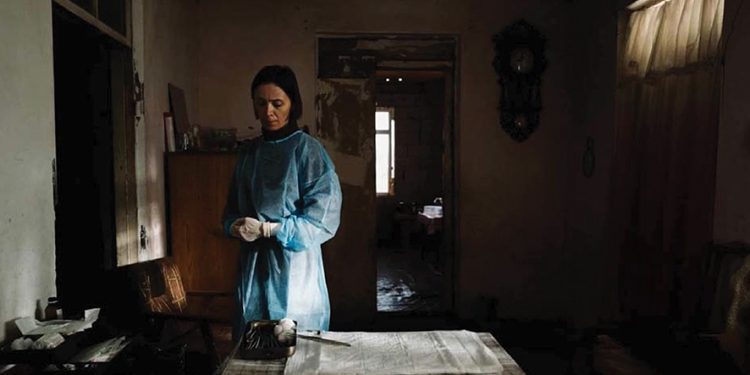Dea Kulumbegashvili’s latest work ‘April,’ awarded the Special Jury Prize at the Venice Film Festival, solidifies her position as one of the most significant voices in contemporary cinema. Following the profound international success of ‘Beginning,’ Kulumbegashvili delves deeper into her stylistic and thematic universe with April, using her signature contemplative style to explore isolation, vulnerability, and human resilience. In this essay, we will examine the intricacies of April, its thematic weight, and Kulumbegashvili’s unique cinematic voice.
Dea Kulumbegashvili’s Cinematic Evolution: From ‘Beginning’ to ‘April’
Dea Kulumbegashvili, the critically acclaimed Georgian filmmaker who stormed onto the international scene with Beginning, has returned with an even more daring and introspective follow-up in April. Her debut, praised for its minimalist aesthetic and unnerving tension, left some critics skeptical of her Haneke- and Reygadas-inspired visual tropes. However, in April, Kulumbegashvili transcends her influences, constructing a haunting, original visual language that is both eerily detached and violently intimate.
With a style rooted in extended static takes, distant figures engaged in inaudible yet crucial conversations, and disquieting moments of sudden violence, April is a brooding examination of a woman’s entrapment in both body and mind. The film’s esoteric quality is reminiscent of auteurs like Jonathan Glazer and Angela Schanelec, blending the uncanny with the mundane in a manner that refuses to provide clear resolutions. It’s a bold, uncompromising work of art that challenges its audience to confront the unspoken traumas of its protagonist—an obstetrics doctor who becomes ensnared in the cyclical violence of her own desires and societal expectations.
Nina’s Struggle: A Reflection of Female Subjugation in Rural Georgia
The narrative centers around Nina, played with stark emotional restraint by Ia Sukhitashvili, an obstetrician working in a provincial Georgian hospital. Her career—dedicated to the intimate and life-altering task of delivering babies—takes a dark turn when a newborn dies under her watch, triggering a professional investigation into her medical practices. This inquiry threatens to reveal her clandestine work: providing illegal abortions and birth control to women in rural villages, where such services are unofficially banned, despite abortion being legal in Georgia up to 12 weeks.
What sets April apart from other films addressing abortion and reproductive rights is its refusal to settle into familiar political rhetoric. This is no ‘Happening,’ where the woman seeking the abortion is given sympathetic foregrounding, nor is it a retread of the oppressive abortionist narratives seen in ‘4 Months, 3 Weeks and 2 Days’ or ‘Vera Drake.’ Nina is not portrayed as a hero or a victim in the conventional sense. Rather, her actions—though justified on the surface—are rooted in a deeper, more disturbing personal pathology.
As the film unspools, Nina’s life is revealed as one of self-inflicted violence. She engages in masochistic sexual encounters with men she picks up on country roads, and her work as an abortionist becomes less about principle and more about sublimating her own unresolved traumas. This unflinching portrayal of a woman who oscillates between control and submission, guilt and desire, is profoundly unsettling. The Georgia Kulumbegashvili presents is a place where modernity is a façade. Beneath the veneer of up-to-date medical facilities and professional accountability, the age-old patriarchy still reigns, and women’s bodies remain, at their core, battlegrounds for male power and prejudice.
The Haunting of Nina: The Monstrous Metaphor
The film’s most visually arresting and symbolically charged element is the faceless, grotesque creature that appears intermittently throughout the story. Its decaying, cadaverous form moves slowly through blackened, oily water, juxtaposed against the distant sounds of children playing. This figure, never fully explained, is a recurring motif in Nina’s internal and external world—a specter that stalks the rural landscapes and gloomy interiors she inhabits.
One might interpret this creature as a manifestation of Nina’s guilt and self-loathing, a monstrous symbol of the lives she has ended or perhaps the child she might have lost. However, Kulumbegashvili leaves its meaning deliberately vague, inviting the audience to grapple with its unsettling presence. The creature is at once unnerving and pitiable, an embodiment of Nina’s fractured psyche, forever trapped between her desire for autonomy and the overwhelming forces of her past and present.
Sound as a Vessel for Internal Turmoil
If the visuals of April disturb with their clinical precision and strange beauty, the sound design amplifies the film’s emotional and psychological dissonance. Lars Ginzel’s layered soundscape, combined with the eerie score by Matthew Herbert, plunges us into Nina’s fractured world. The heightened sound of laborious breathing, the incessant barking of dogs, the grinding gears of her car—all echo the unnerving pressure of rural Georgian life. These elements create a nervy intensity, a constant reminder that Nina’s outer composure is a fragile mask for her inner chaos.
Herbert’s score, played on instruments made from bones, creates a primal, organic resonance that feels as if it emanates from the very earth beneath Nina’s feet. This sonic atmosphere transforms April into something more than a visual narrative; it becomes an auditory experience of Nina’s pain and alienation. The sound design blurs the line between reality and the uncanny, echoing the surreal horror of Nina’s personal journey.
A Cinematic Tour de Force: Long Takes, High Stakes
Kulumbegashvili’s directorial vision is one of extreme patience and precision. April unfolds at a slow, deliberate pace, allowing tension to simmer beneath the surface without ever boiling over. As in Beginning, the camera remains static for long stretches, watching from a distance as characters move through scenes that feel almost mundane—until they don’t. In one particularly harrowing moment, Nina performs an abortion on a kitchen table, her patient’s body hidden off-screen, but her mounting anxiety palpable in every sound and movement.
The film’s pacing, its refusal to rush through these excruciatingly intimate moments, forces the audience to confront the full weight of Nina’s decisions. There is no escape from the emotional and moral complexity of her situation. By withholding conventional cinematic cues, Kulumbegashvili creates a world in which the unseen is as important as what is visible; a world where silence is often louder than dialogue.
A Vision of Despair and Resistance
April is not a film that provides easy answers. It does not offer closure, redemption, or catharsis. Instead, it presents a stark, unflinching portrait of a woman on the brink of collapse, caught in a web of societal expectations, personal trauma, and the unrelenting passage of time. In the end, Nina’s struggle is not just against the oppressive forces of the patriarchy or the limitations of her profession—it is a battle with herself, with the monstrous manifestations of her own guilt and desire.
Dea Kulumbegashvili’s April solidifies her place among the most challenging and visionary directors of contemporary cinema. It is a film that demands attention, patience, and, above all, empathy—a work that haunts the viewer long after the final frame fades to black.
Review by Ivan Nechaev














